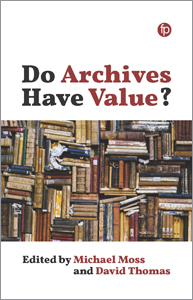
Primary tabs
You don't need to be an ALA Member to purchase from the ALA Store, but you'll be asked to create an online account/profile during the checkout to proceed. This Web Account is for both Members and non-Members.
If you are Tax-Exempt, please verify that your account is currently set up as exempt before placing your order, as our new fulfillment center will need current documentation. Learn how to verify here.
- Description
- Table of Contents
- About the authors
There is a vast literature about ways of measuring value for cultural heritage assets as a whole, particularly museums and visitor attractions, but archives and special collections in libraries have largely been overlooked. They have been very poor at garnering statistical data and devising ways of measuring the impact of what they do, unlike museums and visitor attractions with their much heavier footfall. Do Archives Have Value? discusses the various valuation methods available, including contingent valuation, willingness to pay and value chain, and assesses their suitability for use by archives and special collections. The book also assesses the impact of the transition to the digital in archival holdings, which will transform their character and will almost certainly cost more. The discussion takes place in the context of changing societal expectations of the archive in the wake of child abuse and other scandals where records to address grievances must be kept irrespective of cost. Value is explored in a range of different cultural and organizational contexts with case studies from a range of countries, including Australia, China, Japan, Malawi, Kenya, Russia and Thailand. There are contributions from Nancy Bell, Head of Conservation at The National Archives, Louise Craven, one of the leading UK archival scholars, Paul Lihoma, National Archivist of Malawi, Helen Morgan from the University of Melbourne, Pak Te Lee of the University of Hong Kong and Richard Wato from the National Archives of Kenya. Key topics include
- the value of the Clinton emails for research;
- the value of Russian archives before and after revolution;
- the value of archives in public inquiries - the case of the Hillsborough tragedy;
- the value of Find & Connect - Australia's response to child abuse;
- the Chinese long tradition of record keeping;
- why and how to value;
- valuing digital content; and
- the commercialization of archives.
About the contributors
Introduction
David Thomas and Michael Moss
1 Valuing oral and written texts in Malawi
Paul Lihoma
2 Building an evidenced based culture for documentary heritage collections
Nancy Bell, Michael Moss and David Thomas
3 Value in fragments: an Australian perspective on re-contextualisation
Helen Morgan, Cate O’Neill, Nikki Henningham, Gavan McCarthy and Annelie De Villiers
4 Trusting the records: the Hillsborough football disaster 1989 and the work of the Independent Panel 2010–12
Sarah Tyacke
5 Sharing history: coupling the archives and history compilation in Japan
Sachiko Morimoto
6 Memories of the future: archives in India
Swapan Chakravorty
7 Business archives in Hong Kong: an overview
Pui-Tak Lee
8 The search for Ithaca? The value of personal memory in the archive of the digital age
Louise Craven
9 The commercialisation of archives: the impact of online family history sites in the UK
David Thomas and Michael Moss
10 A search for truthiness: archival research in a post-truth world
Daniel German
Index
Michael Moss
Michael Moss is professor of archival science at the University of Northumbria, UK. Previously, he was research professor in archival studies in the Humanities Advanced Technology and Information Institute at the University of Glasgow, where he directed the Information Management and Preservation MSc program. He is a non-executive director of the National Records of Scotland and until 2014 a member of the Lord Chancellor's Advisory Council on National Archives and Records. In 2015 he was Miegunyah distinguished fellow at the University of Melbourne.
David Thomas
David Thomas is a Visiting Professor at the University of Northumbria where he is involved in research into access to contemporary records. Previously, he worked at the National Archives where he was Director of Technology and was responsible for digital preservation and for providing access to digital material. He has written articles and book chapters on archives, focusing on the implications of the digital.


